Yesterday was the first (and hopefully only) coronavirus Remembrance Day in the UK and the Commonwealth of Nations. It was also Veterans Day in the US. This day is, additionally, recognised in many other countries by many other names, including Armistice Day. November 11th has been a day of remembrance for a huge number of people, since the end of the First World War. It was the day of Armistice, when, at 5:45 am in Compiègne, France, it was agreed that hostilities between the Allies and Germany would cease at 11 am.
And, ever since, on the eleventh hour of the eleventh day of the eleventh month, we remember the fallen.
The First World War was supposed to be The War To End All Wars.
It wasn’t!
Which is why, on November 11th, we also remember the fallen from all the subsequent wars.
In all honesty, the First World War collected a lot of names that were not at all accurate, like The Great War. So called because no one could imagine that a war could be more horrifying or involve as many casualties. Something that turned out not to be even remotely true. It wasn’t even the First World War. That dubious honour falls to the Napoleonic Wars, which were fought across Europe, Africa and both North and South America: a genuine World War, by anyone’s standards.
Still, I digress…
In the US, Veterans Day is a Federal Holiday, which is to say, a day off work. Like a Bank Holiday in the UK. This is, very much, a nice idea.
In the UK, while we don’t have a day off on Remembrance Day, we do have Remembrance Sunday. In a year not affected by Coronavirus, Remembrance Sunday is a time for marches by military personal, past and present. It is a time for gathering at memorials and the laying of wreaths. A time of pomp and ceremony that is attended by royalty and politicians alike. It is a time for remembering, with a mind to not repeating…
It is important.
This year’s, coronavirus, Remembrance Sunday, fell on the 8th, the closest Sunday to Remembrance Day. Which is why, at 11 am on Sunday 8th November 2020, I was up at the West Buckland War Memorial, with about a dozen other people, observing two minutes of silence. Because, we will remember them.
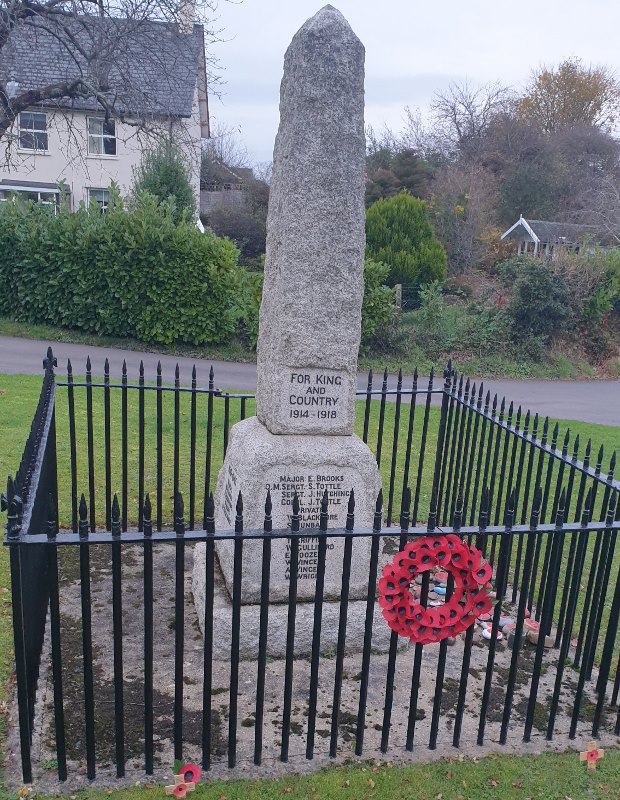
I will remember them!
And as I stood there, head bowed and tears soaking into my coronavirus mask, an unwelcome distraction disturbed my remembrance of the fallen. Something I really didn’t want to be thinking about at this, of all times…
It was a BBC News report, from just two days earlier, about student protests at the University of Manchester. And I’ve got to tell you, it made me very angry.
And, during my walk home on Remembrance day, sodden coronavirus mask in my pocket, that BBC report really got me thinking. But I’ll come back to the student protest at Manchester Uni in a bit.
On a not-unrelated note, did you know that we’ve just passed the one year anniversary of Greta Thunberg‘s infamous speech? Yep, Wednesday 23rd September 2020 marked the anniversary of Greta’s speech during the 2019 UN Climate Action Summit.
“My message is that we’ll be watching you.
“This is all wrong. I shouldn’t be up here. I should be back in school on the other side of the ocean. Yet you all come to us young people for hope. How dare you!
“You have stolen my dreams and my childhood with your empty words. And yet I’m one of the lucky ones. People are suffering. People are dying. Entire ecosystems are collapsing. We are in the beginning of a mass extinction, and all you can talk about is money and fairy tales of eternal economic growth. How dare you!
“For more than 30 years, the science has been crystal clear. How dare you continue to look away and come here saying that you’re doing enough, when the politics and solutions needed are still nowhere in sight.
“You say you hear us and that you understand the urgency. But no matter how sad and angry I am, I do not want to believe that. Because if you really understood the situation and still kept on failing to act, then you would be evil. And that I refuse to believe.
“The popular idea of cutting our emissions in half in 10 years only gives us a 50% chance of staying below 1.5 degrees [Celsius], and the risk of setting off irreversible chain reactions beyond human control.
“Fifty percent may be acceptable to you. But those numbers do not include tipping points, most feedback loops, additional warming hidden by toxic air pollution or the aspects of equity and climate justice. They also rely on my generation sucking hundreds of billions of tons of your CO2 out of the air with technologies that barely exist.
“So a 50% risk is simply not acceptable to us — we who have to live with the consequences.
“To have a 67% chance of staying below a 1.5 degrees global temperature rise – the best odds given by the [Intergovernmental Panel on Climate Change] – the world had 420 gigatons of CO2 left to emit back on Jan. 1st, 2018. Today that figure is already down to less than 350 gigatons.
“How dare you pretend that this can be solved with just ‘business as usual’ and some technical solutions? With today’s emissions levels, that remaining CO2 budget will be entirely gone within less than 8 1/2 years.
“There will not be any solutions or plans presented in line with these figures here today, because these numbers are too uncomfortable. And you are still not mature enough to tell it like it is.
“You are failing us. But the young people are starting to understand your betrayal. The eyes of all future generations are upon you. And if you choose to fail us, I say: We will never forgive you.
“We will not let you get away with this. Right here, right now is where we draw the line. The world is waking up. And change is coming, whether you like it or not.
“Thank you.” (Transcript from NPR)
Full confession: I’ve never been able to watch the actual video of her speech, it makes me cringe. But then, I’ve never been able to watch things like that, not even in fiction.
Please don’t misunderstand, I largely agree with her message. For example, she says, “For more than 30 years, the science has been crystal clear.”
And, in 1992, nearly 30 years ago, the dissertation I submitted for my Bachelors Degree in Quantity Surveying was entitled: Britain’s Sea Defenses Verses Rising Sea Levels. A Disaster in the Making?
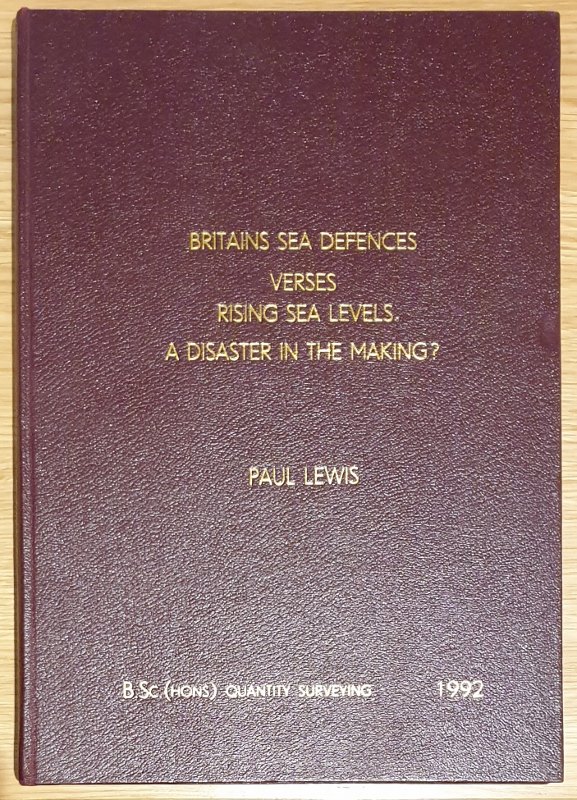
The opening line of the Synopsis for this thesis reads: “So, to conclude, I think the whole world needs to work together, to prevent an excessive sea level rise from taking place.“
Punchy, eh!?
In my defense, this was written during an all-nighter, into the day of the submission deadline. By this stage I had worked out that I didn’t want to be a Quantity Surveyor, but the sunk costs fallacy had taken hold, and I was determined to see it through. As it turned out, I graduated into the teeth of a recession and only ever found six months of employment as a QS. Then the construction industry dried up for the next several years, after which time my degree was worthless. Something I was actually quite relieved about.
Anyway, back to the all-nighter in question… My girlfriend’s dad had kindly allowed her and I to use his office to ‘finish off’ our respective dissertations. I think he thought that it’d only take a couple of hours. In actual fact, I left his office in Cambridge at about 6am, to get back to Dartford in time to meet the 9 am deadline. My girlfriend was still a long way from finishing hers, at 6 am, and told me to go on without her.
She missed the deadline…!
But her submission was still accepted, just as she said she knew it would be. Just as I was equally sure that mine would not be, if it was even a minute late. Ah, good old 90s gender equality…
So, anyway, despite the weakness of the aforementioned sentence, I also said:
However, America is America and I have no doubt, that because it will cost them more money to implement these changes than it would not to, they will avoid the topic. It is this selfish attitude that needs to be overcome.”
A real zinger, I know. But what I’m trying to get at, is that I am in agreement with Greta’s overall message. I was saying the same sort of thing in 1992. Nor do I have any issue with who she is, or how she delivered her speech. My inability to watch her say these things, is a reflection of my own foibles, not of hers.
No, my only criticism is to whom she gave this particular speech.
The speech was delivered to the General Assembly of the United Nations. The General Assembly has 193 member states. Some of these states are the poorest in the world. The leaders of these states had to listen to her chastising them for not doing enough about the environment. In reality, these leaders are more concerned with the number of their citizens who die each day from lack of access to clean water. Or lack of access to shelter. Or lack of access to enough food.
I really wish she’d made this speech at a G8 summit or the World Economic Forum at Davos. And I know that she did speak on many other occasions, including Davos. In an ideal world, she’d have used the ‘How dare you?!’ line at Davos, instead of the UN General Assembly. But then, as Greta is clearly pointing out; this is not an ideal world.
Still, her speech got the message out. And this has made it increasingly hard for countries like America to “avoid the topic”. An achievement for which I will always be grateful.
As a result of this speech, and the campaigns that surrounded it, in September 2019, Climate Change became the cause célèbre du jour (to really mangle those French idioms).
[If anyone wants me to do a post explaining how climate change so clearly is man-made, please let me know…]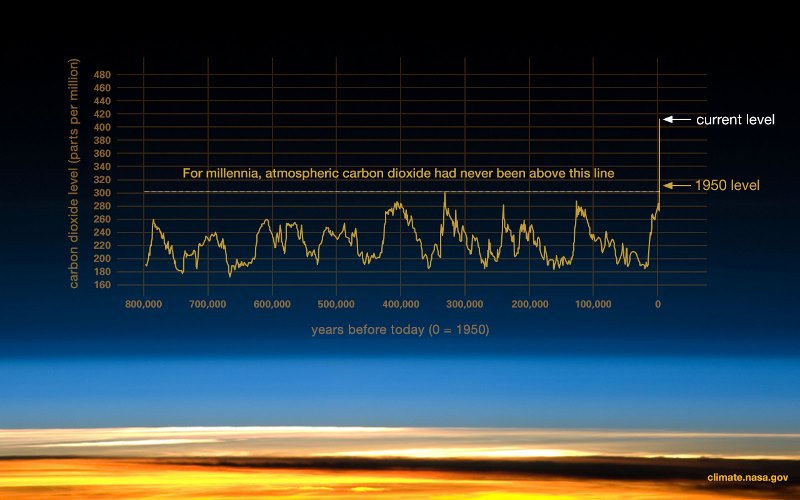
During late September, there was the Global Climate Strike Week. This strike was a continuation of the efforts of Greta (and many others), in regard to the School Strike for Climate. Which is why, on 20th September 2019, 4,000,000 people, across 150 countries, took strike action. This included 300,000 from the UK, many of them children and students.
Greta, herself, had been taking such action since 2018.
You have to respect Greta Thunberg and the impact that she’s made. She really does walk the walk.
And the thing is, much of what she says is right. The youth of our time, along with all future generations, are being sold out, so that a few people can see out their rich and lavish lifestyles. There is a lot of money to be made from fossil fuels and the people making that money will be dead and gone by the time the full impact of what they’ve done takes hold.
Part of Greta’s argument is that all the older generations are selfish and thoughtless, for not thinking of her generation. The implication, presumably, being that her generation will do better…
Which brings me back to a coronavirus remembrance day, and that BBC report on the student protests at Manchester University…
The article details how students discovered workers putting up “huge metal barriers” and that the students had subsequently torn down the “prison-like” fencing.
Just to be clear, here:
- The University, which has a duty under the Health and Safety at Work Act 1974, put up mesh fencing on its campus to, as it says, keep non-students out of the campus
- The students were not informed of this, ahead of time
- Some students carried out criminal damage on the fencing
- Some students gathered in a crowd, in direct contravention of the current COVID-19 National Restrictions of: not meeting anyone else and, if you do, keeping 2 meters apart
- The University subsequently apologised “for the concern and distress caused”
- The University also announced that, “Alternative security measures, including additional security patrols are being put in place.”
The barriers in the video look a lot like Heras Mesh Fencing, with standard clips. Which is to say, they can be taken apart with a spanner! As someone who has carried out work inside prisons, let me confirm: Heras mesh fencing is nothing like a prison.

The BBC report includes a video, in which a speech is being made at the student gathering that I mentioned in point 4, above. The transcript of this part of the video is as follows:
“We have been lied to
“They promised us a safe campus.
“They made us come here, yet they continue to blame the students for the spread of the virus. We’re the ones that are paying here. We’re the ones that are paying thousands of pounds to live in these unsafe halls.
“Student mental health is at an all-time low this year.
“We’re being forced into this situation and then we are being blamed for what is happening.
“It is not our fault.
“It is not out fault!”
This speech leaves me a number of observations:
- Who is this ‘they’ of whom you speak, that ‘made’ you go to the University? Deferral is usually an option. If not, there is no requirement to go to university at all. It’s not like you didn’t know that there was a global pandemic taking place when you chose to go to university.
- With regards to student mental health being, “at an all-time low this year”, you know that there were students during the First World War, right? And the Second World War? A thought that did not escape me during my coronavirus remembrance day vigil!
- The sub-text seems to be that the students are unhappy at being required to live on campus. Correct me if I’m wrong, but I seem to remember a lot of anger from students, during the last academic year, when the Government shut the universities. And I remember there being a lot of push back students about remote learning from their homes. If you could just really plant those goalposts in place, that would be most helpful.
- Of course, universities are businesses first, so if the students weren’t living on-campus, there would be a huge financial hit. Which, necessarily, means that you can’t assume that the decisions being made by the university are focused more on the health of the students, than the bottom line of the business. Capitalism, eh!?
- That said, and in an effort to find the middle ground, universities have set up ‘Bubbles’ within which students must remain. In the case of one university, with which I am familiar, this means that, on a daily basis, students can only mingle with the others in their accommodation block bubble. Additionally, for class and lab work, which typically involves mixing with students from outside the accommodation bubble, the same small group always work together, an a study bubble. In this way, any potential spread of the virus is controlled. Unless students choose to burst these bubbles…
- And if students do choose to burst these bubbles, it is very much their fault!
And that’s the reality. Students are bursting their bubbles. Which is why universities are having to hire additional security personnel. Just like the University of Manchester…
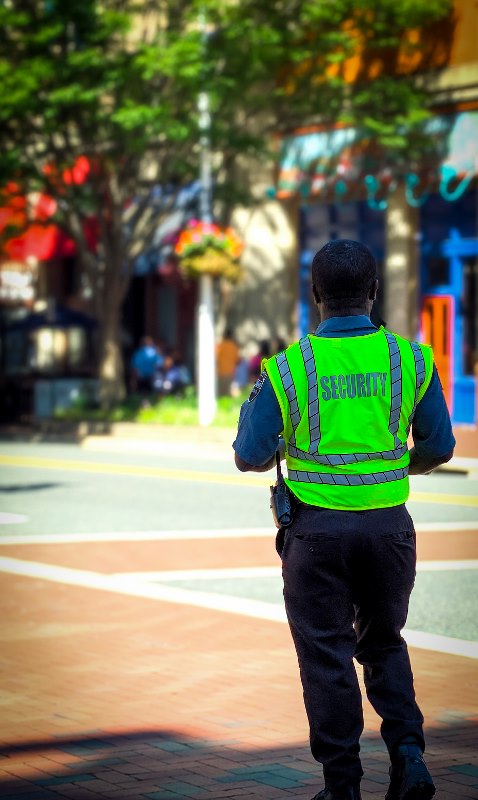
people like this would not be getting as much work…
Photo by Obi Onyeador on Unsplash
A great many students are choosing not to follow the COVID-19 National Restrictions. Every student knows this to be true. Everyone who works at a University knows this to be true. Anyone who has a son or daughter at a university knows this to be true.
As to whether this flouting of the rules is leading to an increase in COVID cases remains uncertain.
But it doesn’t matter…
Now is the time for this generation, Generation Z if you will, to shine. Particularly after the climate strikes and protests of 2019, where Generation Z pointed the finger at every other generation and said, “Why didn’t you think about us, when you were doing what you were doing?!”
So 2020, surely, is Generation Z’s collective chance to think about all the other generations. To protect these other generations by staying in doors for a while. By foregoing socialising until an effective vaccine has been rolled out.
From the perspective of every other generation, Generation Z’s task is a simple and harmless one: just stay at home for a few months.
Instead, we have a woman with a megaphone, in the middle of an illegal gathering, surrounded by the debris of the criminal damage they have just finished inflicting, loudly declaring: “It’s not our fault!”
And I know that I’ll be accused of taking her out of context, and there’s some truth in that. Although not as much as you might like to think. Besides, as a veteran in a coronavirus mask, standing at a war memorial on remembrance day, thinking of this student’s speech, I was feeling a little triggered.
At this point, I’d like to make clear that I know that there are plenty of students who are firmly sticking to the COVID-19 National Restrictions. To these people I say, thank you very much. You are appreciated. Please keep following those rules and, thereby, protecting the elderly.
But, as Greta Thunberg has made clear, generations are not judged by those who do the right thing. Only by those who do the wrong thing.
Take climate change, for example. Renewable energies industries have been designed and built by the older generations.
Nuclear energy, too… Did you know, that in terms of Carbon Dioxide emissions, nuclear power is the greenest energy of all? I’ll circle back to why I bring this up, shortly.
And successful action has been taken by the older generations. CFCs have been banned, worldwide. CFCs were greenhouse gasses that are more than 20,000 times more potent than Carbon Dioxide. As a result of the 1980s ban on CFCs, the holes in the Ozone layers are shrinking. This isn’t to say that anyone is looking for a pat on the back. It’s simply to point out that progress can be made. Some things have been prohibited, and it’s helped.
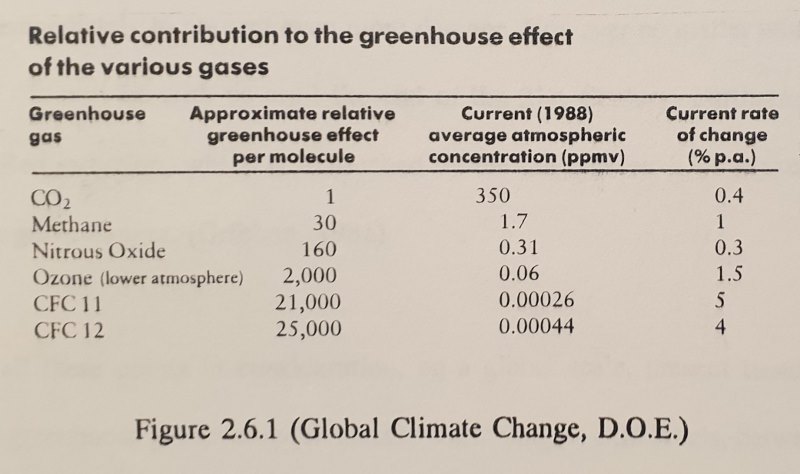
As you can probably tell, this is from a pre-internet era…
Also a long time before any coronavirus disrupted a Remembrance Day.
But none of that matters, in today’s black and white society. It doesn’t matter that Baby Boomers oversaw the banning of CFCs. Nobody cares that people from Generation X developed viable solar panels. It’s irrelevant that Millennials like Boyan Slat are literally cleaning up the oceans.
[Actually, while I’m on this, if you want to do something good this Christmas, or in general, Support the Ocean Cleanup efforts. You can make a direct donation. And, in a stroke of genius, you can buy products made from the mess that the project has cleared out of the oceans. All profits from said purchases go directly back to the project, in order to fund the cleaning up of even more plastic. The current product range is somewhat limited, but it will increase with time. Go on, give is a look; it’s a ray of hope, if nothing else.]And, of course, this black and white over-generalisation and over-simplification works the other way, too.
Since the Baby Boomers, every generation’s life has got easier. Life for a young Boomer (in the UK) was the rebuilding of the nation, after the Second World War, and rationing. All that we, in Generation X, had to deal with were the strikes and power outages of the 70s, leading to the Winter of Discontent. And then the Thatcherism of the 80s. Not fun, by any means, but nowhere near as bad as the Boomers had it. Plus, of course, the Boomers had to live through all that as well.
Then there’s the Millennials, or Generation Y. Not helped by the Great Recession of the late noughties, Millennials have been financially shackled. Something that has typically made it very difficult to leave home until considerably later in life, compared to previous Western generations. Again, a tricky situation, but nothing compared to what the Boomers went through.
Which brings us to the here and now. When a coronavirus pandemic intersects with both Remembrance Day and a grumpy, middle-aged veteran. A middle aged veteran who, as I mentioned in my previous post, is struggling with life at the moment.
Generation Z’s great struggle is being asked to stay housebound for a few months, in order to protect Generations X, Y and Boomer. But a lot of them aren’t doing it. This leads to those older three generations looking at Generation Z and asking, how can you be so selfish? How can you be so thoughtless? Don’t you know how lucky you are, compared to us when we were your age?!
And the answer to that is, no.
No they don’t! How could they? Any more than I could meaningfully understand what rationing was like…
This is Generation Z’s crisis, and it might not seem like much to some of us, but it’s very real to them. Because, of course it is! This is their reality. Not yours (Boomers) and not mine (Gen X).
And it’s no good pointing out that my parents were evacuated during WWII. A phrase that I really don’t think should be used when describing, getting the current students home for Christmas. On the one hand, you have youngsters being given a schedule so they can spend Christmas with their families in the most convenient manner. On the other hand, you had youngsters being taken from their families, in the cities, to live with strangers, in the country, so they didn’t get bombed to death. Their families, incidentally, had to stay in the cities and dodge the bombs…
For media outlets choosing to use the word ‘evacuation’ in relation to university students going home for the holidays: please don’t. Instead, why not try and have some sodding respect for the abject misery that my parents’ generation went through…?!
Moving on…
Likewise, it’s without context, for those of Generation Z, that both of my grandfathers saw active service during the First World War. That I lost at least one Great Uncle during that particular horror show (at High Wood, to be precise). Or that a lot of the teenagers that fought in the First World War (and the Second World War) were conscripted into the armed forces, whether they liked it or not.

Remembrance Day is so important to me, Coronavirus, or no Coronavirus, you could do worse than start here.
The simple reality is that Generation Z is the safest, most protected generation that has ever lived…
Just like every other generation that came before it, and long may it remain so. Actually, maybe not ‘every’ generation. I mean, there have been a couple of periods in history when it went the other way. Like when the Romans left Britain, and it took a thousand years to get back to the standard of living we had when they were here. The first 100 years of that was tougher for every new generation.
Look, the point that I’m trying to make is that the world is more greyscale than black and white. We need to try and see things from the perspective of other people, before we make assumptions and judgments. Walk a mile in their shoes, and all that…
What we all have to accept is that, it takes all of us to make up the whole picture. Like it, or not, we’re all in this together, and we all have a role to play. Just as it has always been. Generation Z might well be angry that the other generations are expecting them to help towards fixing climate change, but we need that help. The whole of humanity needs that help…
Renewables are fine, when they’re generating. But to be a viable alternative to fossil fuels, the problem of power storage needs to be resolved. Batteries!
So far, no one has been able to come up with a battery that is both:
- efficient and effective enough to collect and store renewable energy, when it is in abundance, and;
- able to release it into the grid, upon demand.
We simply haven’t got there yet. It’s really a very tricky project, and it’ll need someone from Generation Z to finish the job. And whoever that might be, will need to be mindful of the issue of disposal…
Old batteries are famously toxic. Which means that when these batteries are being designed, their whole lifetime needs to be considered. Including their safe disposal. Otherwise we’re back to the nuclear issue, which I mentioned earlier. It doesn’t matter how low-carbon an energy solution might be, if the waste it generates cannot be controlled.
And, yes, we’re also expecting Generation Z to come up with a way to scrub the Carbon Dioxide from the atmosphere. Because, so far, an effective way to do so has not been developed. The work has started but there hasn’t been the time or technological advancement to see it through. Which is where Generation Z needs to step in.
Mind you, if the future scientists of Generation Z are looking for something to do with all that reclaimed Carbon, I might have a solution… Convert it into carbon nanotubes and use it to construct a Skyhook. Such a Space Elevator would not only tie up all that excess Carbon Dioxide, it would also make for a low-carbon route into space. Winner, winner, chicken dinner!

By NASA/Pat Rawlings – Public Domain, https://commons.wikimedia.org/w/index.php?curid=326317
So, with all that said, my concern, at the moment, is that Generation Z might not follow the footsteps of Greta Thunberg. Which is to say, actually engage with those that they don’t like, to collectively build towards a better tomorrow.
Generation Z might choose, instead, to go the way of the Manchester University megaphone student. A path that leads to tearing down what you don’t like, and then standing in the debris and shouting, “it’s not our fault!” A path that involves waiting for someone else to sort out a better tomorrow, all the time complaining about how long it’s taking.
‘It’s not our fault’ that the coronavirus is spreading, megaphone student insists, two days before remembrance day.
Really? Are you absolutely sure? How do you know for certain? Because if you’re wrong, people might die…
And it’s easy to say that it isn’t you that’s spreading the virus, because there’s no real way to be told that you’re wrong. After all, 80% of cases are mild or asymptomatic. Which means that you might have it, but not know. You might already have had it, but never find out exactly when that was.
All of which means that you can never be sure that you’re not passing it on. That you haven’t already passed it on. Which is why everyone is being asked to stay indoors.
The older generations know that you don’t like being stuck inside, no one does. We also know that you’re not doing it for your own benefit. We just wish that you’d assume the worst, stay at home and take one for the team. The ‘team’ in this instance, being society.
And, of course, I know that a lot of Generation Z are going to ignore all this, There will be arguments along the lines of, “Well, it doesn’t effect me, so why should I stay inside? Let the vulnerable people stay inside; they’re the ones in danger…”
Sure, except that’s not what your Government is telling you to do*. We’re all being asked to stay inside to bring the R Rate under control. The problem with the above scenario is that it drags on for years. The virus trickling between those who are not in any real danger, with the vulnerable having to stay inside for the whole time. In addition, it’s now been established that the virus can be caught more than once. Furthermore, the more people that coronavirus infects, the more likely it is to mutate. Meaning the less likely it is that a vaccine will be effective.
[*Before anyone goes off on an “it’s not my Government, I didn’t vote for them” rant, please first read up on Parliamentary Democracy]
Image by Pete Linforth from Pixabay
So the upshot of this type of argument, which we’ve all heard someone say, is that the elderly have to stay housebound for years. Potentially for the rest of their lives. Just so that the fit and healthy can avoid being cooped up for a couple of months.
That is not a reasonable trade.
It is not thinking about how your actions impact on other generations. It is, instead, doing exactly the same thing that Greta Thunberg has pointed out that the older generations are guilty of, in relations to Generation Z and climate change.
But that’s where we are…
And I’m not surprised or disappointed or angry. Generation Z had the chance to put their money where their mouth was, and show that they could be different from the rest of us. To evolve and be better. To think of other generations before their own.
But just like all the other generations didn’t, Generation Z isn’t either.
So, welcome to humanity. You’re just as selfish and thoughtless as the rest of us. In realty, though, what else were you ever going to be?
Were I still as angry as I was on the coronavirus remembrance day, I might want to finish this post by saying something like, “Oh, and if you need a hand getting down from that high horse, do let me know.”
Or, when I was at my angriest, some variation of, “Just think: in 50 years, all those War Memorials, that you never visit, could be repurposed as Coronavirus Remembrance Day Memorials. Every November 11th would be COVID Day and you could stand around the memorials thinking back to the time you were asked to stay indoors for a while, loudly chanting, ‘It’s not our fault!'” for two minutes.
But I’m not that angry any more. Primarily because I’ve sat on this post for a couple of days longer than indicated in the opening paragraph. A side effect of which, is that it’s twice as long as I intended, meaning I now have to fit the key phrase of ‘Coronavirus Remembrance’ into the text 20 times.
20 times!
Do you know how difficult it is to fit any phrase into a post 20 times, let alone coronavirus remembrance?! And, yes, I know that you know what I’m try to do. I’ll stop it now…
… coronavirus remembrance…!
Dammit, still two short. Maybe I can shoehorn them into the photo texts?
Yeah, there you go…
So, anyway, I won’t finish this post with either of those lines. Because, although I’ve clearly followed both trains of thought, neither of them is particularly fair. Or helpful!
Instead, I shall conclude with the following:
Generation Z’ers… You know that feeling of contempt that you sometimes hold for your parents and grandparents? Well, your kids and grandkids are going to feel exactly the same way towards you. Just like every generation before them.
And you can stand there and explain how it wasn’t your fault, but I suspect that your grandchildren will disagree…
Grandkids, eh!

6 thoughts on “Coronavirus Remembrance Day”
I feel angry when I hear that people break the lockdown to socialise, therefore risking transmitting the virus (maybe unknowingly, as you said, some people have few, or no symptoms). Meanwhile, some of us abide by the rules, and don’t get to see our families for almost a year. Selfishness is a massive plague. Just think back to these 2 words from the first lockdown: toilet paper.
Did you like the bit where I butchered the French expressions?!
It was actually quite correct!
Is there no end to the number of ways that you can spoil my fun…!?
MWAHAHAHAHAHAH
Read most of it lumps.